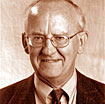Commentary on Exodus 19:2-8a
During the four years that I was a student at Luther Seminary I can recall only one assignment which involved memorization of Scripture. In his course on the Pentateuch, Professor John Milton required us to memorize Exodus 19:4-6.
Milton’s pedagogical and theological instincts were correct. These words about Exodus, Covenant and People of God express what is central to the faith of the Old Testament and in fact set the stage for the Good News announced in the New Testament.
Historical and Literary Observations on the Text
After the miraculous deliverance from Egypt (Exod 1-15) and several months of making their way through the desert wilderness (16-18) the Israelites have arrived at Mount Sinai and are camped at the foot of the mountain (19:1-2). Most scholars would date the Exodus around 1280 BCE. and would locate the mountain at the southern tip of the Sinai Peninsula. The significance of the events at Sinai is evident from the fact that in the biblical narrative, the people do not leave Sinai until Numbers 10:11-12.
As to genre, these chapters include both historical and legal material, or in other words, both story and law. There are hints that this material was used in a worship setting. The sounding of the trumpet (19:13, 16, 19), the smoke (19:18) and the preparations described in 19:10-15 all hint at a re-enactment of the Sinai events in worship.
The text for today consists of a word from God (4-6) set in a narrative framework (19:2-3; 7-8).
Reading the Text
Central to this text is the message from God in vv. 4-6. The introductory formula, “Thus you shall say” is reminiscent of the “Thus says the LORD” formula used by the prophets.
This word from God in 4-6 recognizes that there is already an established relationship between God and the ones addressed. These words are not aimed at just any people, but at the “house of Jacob,” the “Israelites.” (3). These are not words which God speaks about these people, but this is I-you language, where God addresses the people directly: “You have seen what I did…how I bore you…and brought you to myself…” etc.
This word from God begins with a reminder of what God has done for this people, first in literal language (“what I did”) and then with a metaphor (“how I bore you on eagles’ wings and brought you to myself”). The picture is that of a parental eagle bearing one of its young on its wings; see also Deut 32:11 and Prov 30:18-19 for further eagle imagery.
This word indicates an expected response of God’s people, in terms of obedience and covenant keeping. The shape of that covenant obedience is sketched out in the Ten Commandments in Exodus 20.
This word from God includes a promise that these people will be the LORD’s treasured possession. The word translated “treasured possession” occurs elsewhere in the Bible to denote the treasure belonging to kings (1 Chron 29:3; Eccl 2:8).
Finally, the people addressed are identified as a kingdom of priests and a holy nation. If the priest is an entire nation, then the parish is the whole world! The sense of a “holy” nation is one that is set apart for a purpose.
The statement, “the whole earth is mine” indicates that the LORD has mastery over not only humans, but over all the creatures and forces of nature as well.1
Toward Preaching the Text: “Who Do We Think We Are?”
The sermon ought to begin with a brief retelling of how the Israelites became slaves in Egypt, how they prayed to the LORD for help (Exod 2:24-25), and the extended negotiations that went on between Moses, Aaron and Pharaoh. The climax is the story of God’s answer to prayer in delivering the people from the Egyptians at the Sea of Reeds.
The preacher could note that Israel never got over whatever it was that happened there! The deliverance from Egypt counts as one of the “mighty acts of God” and is recalled in creeds (Deut 26; Josh 24), prophetic sayings (Jer 2:6; Hos 11:1-2; Amos 3:1-2), songs (Exodus 15) and psalms (105, 106, 114, 135, 136). To this day our Jewish neighbors recall these events in the celebration of the Passover. Christians recall the Exodus in hymns for the Easter season, such as “At the Lamb’s High Feast We Sing, “Come, You Faithful Raise the Strain,” and “Christ Jesus Lay in Death’s Strong Bands.”
The central focus of the sermon ought to be on the word from God in verses 4-6. Here are three R’s:
- the relationship to God which exists,
- the reminder of what God has done, and
- the expected response of God’s people in praise and obedience.
Then there is the promise that these people will be God’s treasured possession, a kingdom of priests and a holy nation.
The sermon could move to consider Matthew 9:35-10:8, the Gospel for this day, which tells of Jesus choosing twelve apostles. The selection of twelve apostles is an indication that Jesus is going about the task of forming a new people of God, with these disciples as the twelve founding figures, balancing the twelve sons of Jacob in Israel.
Any sermon on this Exodus 19 text should then consider how the text is re-vitalized in 1 Peter 2:9-10. Addressed to Christians scattered about the Roman world (1 Peter 1:1-2), the writer calls this new people of God a “chosen race, royal priesthood, a holy nation, God’s own people,” using language and concepts drawn from Exodus 19.
After identifying who these Christians are, the writer tells them why they are: their task is a missionary one, to proclaim the mighty acts of the God who has called them out of darkness into light. If the priest is a whole nation, then the parish is the world.
1Terence E. Fretheim, The Pentateuch (Nashville: Abingdon 1996), 117-119.

June 15, 2008